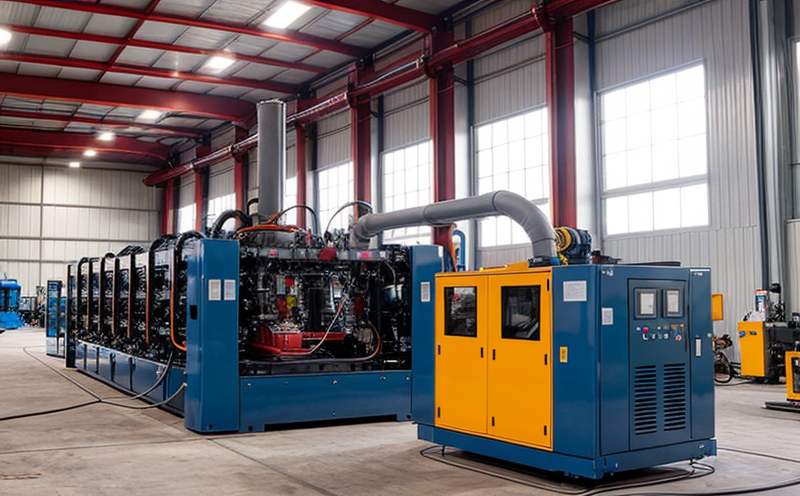
-
Industrial Equipment Certification-
Performance and Efficiency Testing for Industrial Equipment-
Certification for Automated Industrial Equipment Performance
We provide comprehensive solutions designed to help our clients mitigate risks, enhance performance, and excel in key areas such as quality, health & safety, environmental sustainability, and social responsibility.
Discover
For many years, our organization has been operating successfully, boasting modern laboratories that meet international standards. These laboratories are equipped with the latest technology devices and equipment, and we have built a strong team of experienced and trained personnel to operate them.
DiscoverWelcome to Eurolab, your partner in pioneering solutions that encompass every facet of life. We are committed to delivering comprehensive Assurance, Testing, Inspection, and Certification services, empowering our global clientele with the ultimate confidence in their products and processes.
Discover
-
Industrial Equipment Certification-
Performance and Efficiency Testing for Industrial Equipment-
Certification for Automated Industrial Equipment PerformanceCertification for Automated Industrial Equipment Performance
The performance of automated industrial equipment has become increasingly important as industries strive to improve efficiency, reduce costs, and ensure quality in their manufacturing processes. In recent years, there has been a growing need for certification programs that measure the performance of these systems and provide assurance to stakeholders that they meet specific standards.
What is Certification?
Certification is an independent third-party assessment of an automated industrial equipment systems ability to perform as intended. It involves verifying that the system meets specified requirements or standards, which can include but are not limited to: safety, reliability, energy efficiency, and environmental sustainability. The primary goal of certification is to provide assurance to stakeholders, including manufacturers, owners, operators, and regulatory bodies, that the equipment has been designed, installed, and maintained according to established guidelines.
Benefits of Certification
There are numerous benefits associated with certifying automated industrial equipment performance:
Key Principles:
Customer focus
Leadership and commitment to quality
Involvement of people
Process approach
Continual improvement
Factual approach to decision-making
Benefits:
Improved customer satisfaction
Reduced errors
Increased efficiency
Better communication among stakeholders
Key Principles:
Environmental policy
Roles and responsibilities
Training, awareness, and competence
Document control
Operations planning and control
Emergency preparedness and response
Benefits:
Reduced environmental impact
Improved stakeholder confidence
Enhanced reputation
Key Principles:
Energy policy
Roles and responsibilities
Training, awareness, and competence
Document control
Operations planning and control
Performance measurement and monitoring
Benefits:
Reduced energy consumption
Lower costs
Improved efficiency
QA Section
The following QAs provide additional information on certification for automated industrial equipment:
1. What is the cost of certification?
The cost of certification varies depending on the type of system, complexity, and industry-specific requirements.
2. How long does the certification process take?
The certification process can take several weeks to months, depending on the scope of work and availability of resources.
3. Can I certify my equipment in-house?
No, certification requires an independent third-party auditor to ensure impartiality and credibility.

Lighting and Optical Device Testing
Lighting and Optical Device Testing: Ensuring Performance and Safety Lighting and optical devices a...

Pressure Vessels and Installations Testing
Pressure Vessels and Installations Testing Pressure vessels are a critical component of various ind...

Electromechanical Safety Certification
Electromechanical Safety Certification: Ensuring Compliance and Protecting Lives In todays intercon...

IT and Data Center Certification
IT and Data Center Certification: Understanding the Importance and Benefits The field of Informatio...

Industrial Equipment Certification
Industrial equipment certification is a critical process that ensures industrial equipment meets spe...

Military Equipment Standards
Military Equipment Standards: Ensuring Effectiveness and Safety The use of military equipment is a ...

NEBS and Telecommunication Standards
Network Equipment Building System (NEBS) and Telecommunication Standards The Network Equipment Bu...

Chemical Safety and Certification
Chemical safety and certification are critical in ensuring the safe management of products and proce...

Environmental Simulation Testing
Environmental Simulation Testing: A Comprehensive Guide In todays world, where technology is rapidl...

Transportation and Logistics Certification
Transportation and Logistics Certification: A Comprehensive Guide The transportation and logistics ...

Hospitality and Tourism Certification
Hospitality and Tourism Certification: Unlocking Opportunities in the Industry The hospitality and ...

Electrical and Electromagnetic Testing
Electrical and Electromagnetic Testing: A Comprehensive Guide Introduction Electrical and electrom...

Pharmaceutical Compliance
Pharmaceutical compliance refers to the adherence of pharmaceutical companies and organizations to l...

MDR Testing and Compliance
MDR Testing and Compliance: A Comprehensive Guide The Medical Device Regulation (MDR) is a comprehe...

Cosmetic Product Testing
The Complex World of Cosmetic Product Testing The cosmetics industry is a multi-billion-dollar ma...

Railway Industry Compliance
Railway Industry Compliance: Ensuring Safety and Efficiency The railway industry is a critical comp...

Product and Retail Standards
Product and Retail Standards: Ensuring Quality and Safety for Consumers In todays competitive marke...

Renewable Energy Testing and Standards
Renewable Energy Testing and Standards: Ensuring a Sustainable Future The world is rapidly transiti...

Battery Testing and Safety
Battery Testing and Safety: A Comprehensive Guide As technology continues to advance, battery-power...

Food Safety and Testing
Food Safety and Testing: Ensuring the Quality of Our Food As consumers, we expect our food to be sa...

Construction and Engineering Compliance
Construction and Engineering Compliance: Ensuring Safety, Quality, and Regulatory Adherence In the ...

Environmental Impact Assessment
Environmental Impact Assessment: A Comprehensive Guide Environmental Impact Assessment (EIA) is a c...

Energy and Sustainability Standards
In today’s rapidly evolving world, businesses face increasing pressure to meet global energy a...

Aviation and Aerospace Testing
Aviation and Aerospace Testing: Ensuring Safety and Efficiency The aviation and aerospace industr...

Trade and Government Regulations
Trade and government regulations play a vital role in shaping the global economy. These regulations ...

Healthcare and Medical Devices
The Evolution of Healthcare and Medical Devices: Trends, Innovations, and Challenges The healthcare...

Agricultural Equipment Certification
Agricultural equipment certification is a process that ensures agricultural machinery meets specific...

Automotive Compliance and Certification
Automotive Compliance and Certification: Ensuring Safety and Efficiency The automotive industry is ...

Fire Safety and Prevention Standards
Fire Safety and Prevention Standards: Protecting Lives and Property Fire safety and prevention stan...

Consumer Product Safety
Consumer Product Safety: Protecting Consumers from Harmful Products As a consumer, you have the rig...